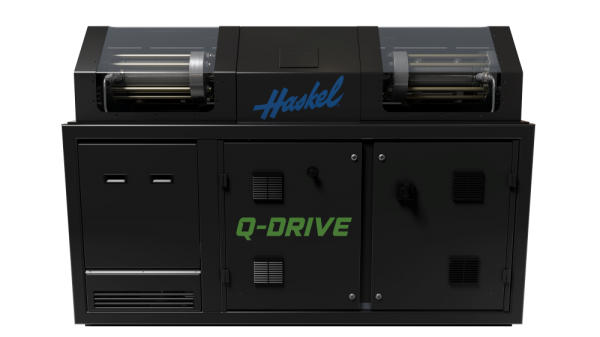
In underground mining environments, gas boosters are often working behind the scenes to pressurize gases for recharging rebreather cylinders, fire suppression, environmental cooling or gas scavenging.
Traditional pneumatic and hydraulic gas boosters have some inherent limitations.
Pneumatic units work well to boost pressures at intermittent, low-flow rates, but are noisy during operation, which also increases the amount of electricity required.
A new category of advanced electric gas boosters is promising quieter, cleaner, high-pressure operations with flow rates of up to 6,500 psi
Hydraulic-powered units are better suited to continuous operation but come with the potential risk of oil leaks and spills.
A new category of advanced electric gas boosters is promising quieter, cleaner, high-pressure operations with flow rates of up to 6,500 psi alongside improved monitoring and controls for a variety of mining applications.
This year, Haskel, a company manufacturing a range of liquid pumps, gas boosters, air pressure amplifiers and high-pressure valves, plans to release the Q-Drive advanced industrial electric gas booster.
At less than 77 decibels during operation, the Q-Drive is a quieter alternative that still offers up to 6,500 psi for high-pressure applications.
“Compared to pneumatic gas boosters, advanced electric units use one-third of the energy and offer flow rates 10 to 20 times higher,” George Volk, global director of sales and business development at Haskel, said in a release.
“Compared to hydraulic boosters, the electric units also provide energy savings due to lower cooling requirements.”
The Q-Drive includes a human machine interface (HMI) and touchpad control to allow operators to monitor and control pressure and temperature closely and easily change setpoints.
“With the considerable R&D investment in these more advanced electric gas boosters, many of the shortcomings of pneumatic and hydraulic units have been resolved and this opens up new possibilities for mining applications at high flow rates and pressures,” Volk added.
Gas booster applications in mining include mine rescue equipment maintenance, reverse circulation drilling and nitrogen injection for mine fire suppression.
(This article first appeared in the Canadian Mining Journal)